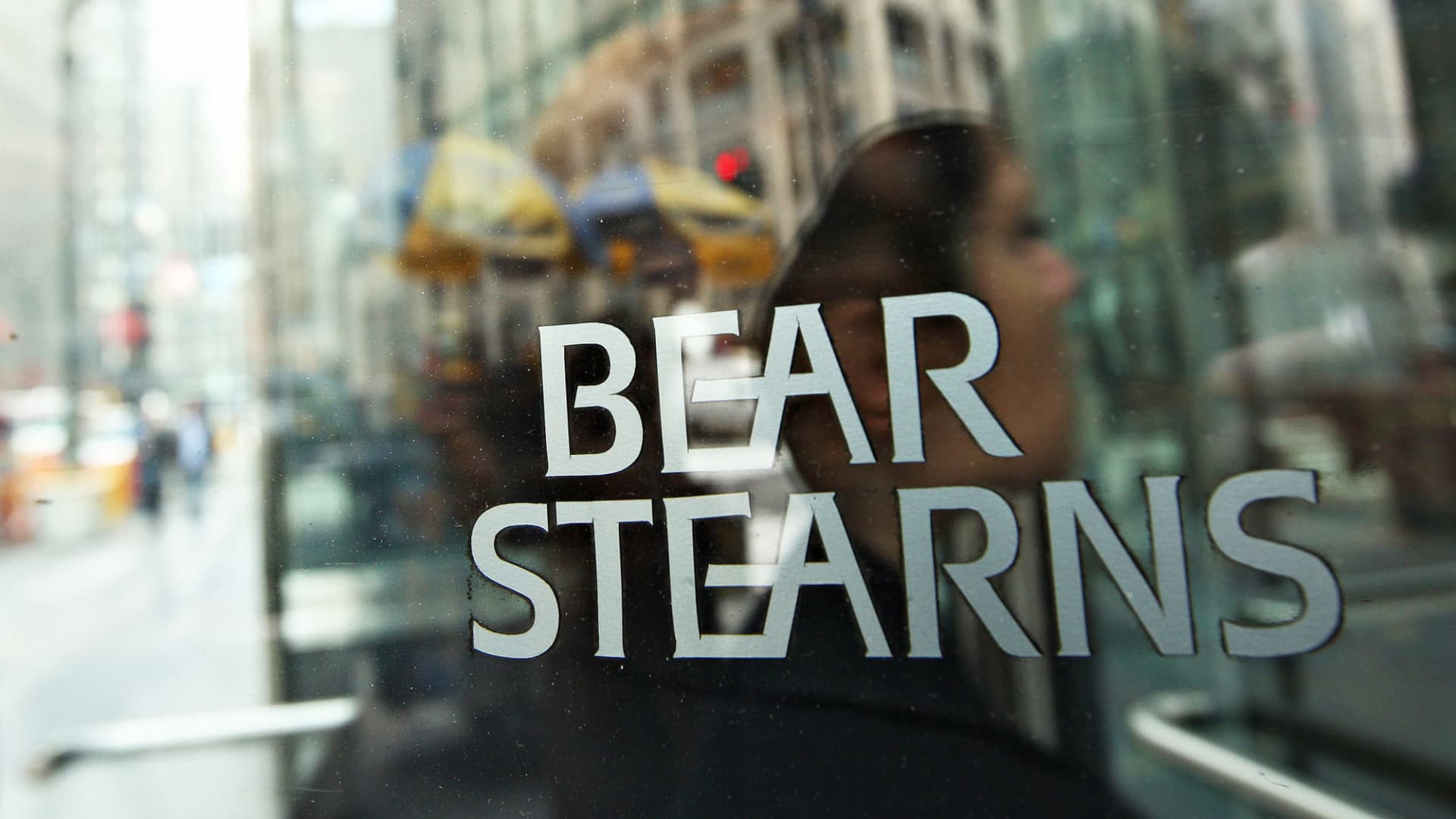$60 billion Terra washout not crypto’s Bear Stearns moment: regulators

WASHINGTON — It’s been a brutal few weeks for the crypto market.
Half a trillion dollars was wiped off the sector’s market cap as terraUSD, one of the most popular U.S. dollar-pegged stablecoins, imploded virtually overnight.
Meanwhile, digital coins such as ether continue to take a beating on the price charts, as the sell-off keeps hammering the industry.
Some investors have called the events of the last month a Bear Stearns moment for crypto, comparing the contagion effect of a failed stablecoin project to the fall of a major Wall Street bank that ultimately foretold the 2008 mortgage debt and financial crisis.
“It really revealed some deeper vulnerabilities in the system,” said Michael Hsu, acting Comptroller of the Currency for the U.S. Treasury Department.
“Clearly, you saw contagion, not just from terra to the broader crypto ecosystem, but to tether, to other stablecoins, and I think that’s something that wasn’t assumed. And I think that’s something people have to really pay attention to.”
But so far, government officials don’t seem to be worried about a crypto crash taking down the broader economy.
Several senators and regulators told CNBC on the sidelines of the DC Blockchain Summit this week that the spillover effects are contained, crypto investors shouldn’t freak out, U.S. regulation is the key to success for cryptocurrencies, and crucially, the crypto asset class isn’t going anywhere.
“There need to be rules to this game that make it more predictable, transparent, where there are the needed consumer protections,” said Sen. Cory Booker, D‑NJ.
“What we don’t want to do is choke a new industry and innovation out so that we lose out on opportunities. Or what I’m seeing right now, a lot of these opportunities just move offshore, and we’re missing the economic growth and job creation that’s a part of it. So this is a really important space if we get the regulation right, that can actually be helpful to the industry and protecting consumers,” continued Booker.
A contained event
In early May, a popular stablecoin known as terraUSD, or UST, plummeted in value, in what some have described as a “bank run,” as investors rushed to pull out their money. At their height, luna and UST had a combined market value of almost $60 billion. Now, they’re essentially worthless.
Stablecoins are a type of cryptocurrency whose value is tethered to the price of a real-world asset, such as the U.S. dollar. UST is a specific breed, known as an “algorithmic” stablecoin. Unlike USDC (another popular dollar-pegged stablecoin), which has fiat assets in reserve as a way to back their tokens, UST depended on computer code to self-stabilize its value.
UST stabilized prices at close to $1 by linking it to a sister token called luna through computer code running on the blockchain — essentially, investors could “destroy” one coin to help stabilize the price of the other. Both coins were issued by an organization called Terraform Labs, and developers used the underlying system to create other applications such as NFTs and decentralized finance apps.
When the price of luna became unstable, investors rushed out of both tokens, sending prices crashing.
UST’s failure, though infectious, wasn’t much of a surprise to some crypto insiders.
Coin Metrics’ Nic Carter tells CNBC that no algorithmic stablecoin has ever succeeded, noting that the fundamental problem with UST was that it was largely backed by faith in the issuer.
Sen. Cynthia Lummis, R‑Wyo., who is among the most progressive lawmakers on Capitol Hill when it comes to crypto, agrees with Carter.
“There are a couple types of stablecoins. The one that failed is an algorithmic stablecoin, very different from an asset-backed stablecoin,” Lummis told CNBC. She said she hoped consumers could see that not all stablecoins are made equal and that choosing an asset-backed stablecoin is essential.
That sentiment was echoed by the managing director of the International Monetary Fund at the World Economic Forum’s annual meeting in Davos.
“I would beg you not to pull out of the importance of this world,” said IMF chief Kristalina Georgieva. “It offers us all faster service, much lower costs, and more inclusion, but only if we separate apples from oranges and bananas.”
Georgieva also stressed that stablecoins not backed by assets to support them are a pyramid scheme and emphasized that the responsibility falls to regulators to put up protective guardrails for investors.
“I think it is likely that we’re going to have regulation happen faster because of the events of recent weeks,” said Securities and Exchange Commission’s Hester Peirce, who also noted that stablecoin legislation was already on the docket before the fall of UST.
“We have to make sure to…preserve the ability of people to experiment with different models, and do so in a way that fits within regulatory guardrails,” continued the SEC Commissioner.
Legislating against shadow banking
For Commissioner Caroline Pham of the Commodity Futures Trading Commission, the UST meltdown highlights just how much action regulators need to take to protect against a possible return of shadow banking — that is, a type of banking system in which financial activities are facilitated by unregulated intermediaries or under unregulated circumstances.
Pham says a lot of existing safeguards could do the trick.
“It’s always faster to stand up a regulatory framework when it’s already existing,” said Pham. “You’re just talking about extending the regulatory perimeter around newer, novel products.”
Months before the UST algorithmic stablecoin project failed, the President’s Working Group on Financial Markets published a report outlining a regulatory framework for stablecoins. In it, the group divides the stablecoin landscape into two main camps: trading stablecoins and payment stablecoins.
Today, stablecoins are typically used to facilitate trading of other digital assets. The report looks to set down best practices to regulate stablecoins to be more widely used as a means of payment.
“For those who are like me, bank regulators, we’re kind-of historians of money-like instruments,” said Hsu, whose Office of the Comptroller of the Currency co-authored the report.
“This is a really familiar story, and the way to deal with it is prudential regulation. This is why I think some of the options, the proposals for more of a bank kind of regulatory-type approach is a good starting point.”
The key question that regulators and lawmakers need to address is whether stablecoins, including the subset of algorithmic stablecoins, are in fact derivatives, says Pham.
If people started to think about some of these really novel crypto tokens as frankly, lottery tickets. When you go and you buy a lottery ticket, you might strike it big, and get rich quick, but you might not.
Caroline Pham
CFTC commissioner
Generally speaking, a derivative is a financial instrument that allows people to trade on the price fluctuations of an underlying asset. The underlying asset can be almost anything, including commodities such as gold or — according to the way the SEC is currently thinking — a cryptocurrency such as bitcoin.
The SEC regulates securities, but for everything that is not a security, the CFTC probably has some regulatory touchpoint over it, says Pham.
“We have the regulation over derivatives based on commodities, but we also have certain areas … where we directly regulate spot markets,” said Pham.
“The last time we had … something blow up like this in the financial crisis — risky, opaque, complex financial products — Congress came up with a solution for that, and that was with Dodd-Frank,” continued Pham, referring to the Wall Street Reform and Consumer Protection Act, passed in 2010 in response to the Great Recession. The act included stricter regulation of derivatives, plus new restrictions related to the trading practices of FDIC-insured institutions.
“If some of these trading stablecoins are, in fact, derivatives, basically, you’re talking about a custom basket swap, and then it’s the dealer who has to manage the risk associated with that,” explained Pham.
Congress calls the shots
Ultimately, SEC Commissioner Peirce says, Congress calls the shots on how to move forward on crypto regulation. While Wall Street’s top regulator is already acting using the authority that it has, Congress needs to divvy up enforcement responsibilities.
Lummis has paired up with Sen. Kirsten Gillibrand, D‑N.Y., to spell out this division of regulatory labor in a proposed bill.
“We’re setting it on top of the current regulatory framework for assets, including the CFTC and the SEC,” Lummis told CNBC. “We’re making sure that the taxation is capital gains and not ordinary income. We’ve dealt with some accounting procedures, some definitions, we’re looking at consumer protection and privacy.”
The bill also delves into stablecoin regulation. Lummis says that the bill contemplates the existence of this specific subset of digital assets and requires that they either be FDIC-insured or more than 100% backed by hard assets.
Booker says there is a group in the Senate with “good folks on both sides of the aisle” coming together and partnering to get it right.
“I want there to be the right regulation,” continued Booker. “I don’t think the SEC is the place to regulate a lot of this industry. Clearly, ethereum and bitcoin, which are the majority of the cryptocurrencies, are more commodity-like.”
But until Capitol Hill pushes a bill into law, Pham says that crypto investors need to exercise a whole lot more caution.
“If people started to think about some of these really novel crypto tokens as frankly, lottery tickets, when you go and you buy a lottery ticket, you might strike it big, and get rich quick, but you might not,” said Pham.
“I think what I’m worried about is that without appropriate customer protections in place, and the right disclosures, that people are buying some of these crypto tokens thinking that they’re guaranteed to strike it rich,” she said.


